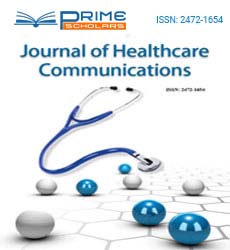Commentary - (2022) Volume 7, Issue 10
Brief Study on how Ambulatory Care Saves Many Lives in Time
Joseph Connell*
Department of Public Health, Wales and Swansea Bay University, UK
*Correspondence:
Joseph Connell,
Department of Public Health, Wales and Swansea Bay University,
UK,
Email:
Received: 03-Oct-2022, Manuscript No. IPJHCC-22-14878;
Editor assigned: 05-Oct-2022, Pre QC No. IPJHCC-22-14878 (PQ);
Reviewed: 19-Oct-2022, QC No. IPJHCC-22-14878;
Revised: 24-Oct-2022, Manuscript No. IPJHCC-22-14878 (R);
Published:
31-Oct-2022, DOI: 10.36846/IPJHCC-7.10.70047
Description
Walking care or short term care is clinic treatment outfitted on
a short term premise, which incorporates analysis, perception,
discussion, treatment, intercession, and restoration contributions.
This care can incorporate predominant logical age and
strategies regardless of whether outfitted outside of hospitals.
Walking care tricky circumstances (ACSC) are wellness circumstances
wherein appropriate mobile consideration forestalls or
decreases the need for clinical foundation affirmation (or long
term care), including diabetes or consistent obstructive pneumonic
disease. Numerous logical examinations and solutions
for intense and persistent sicknesses and preventive wellness
care might be executed on a wandering premise, which incorporate
minor careful and logical strategies, greatest kinds of
dental contributions, dermatology contributions, and heaps of
kinds of indicative strategies (for example blood tests, X-beams,
endoscopy and biopsy strategies of shallow organs). Different
kinds of wandering consideration contributions envelop crisis
visits, recovery visits, and in a couple of cases cell phone consultations.
Medical clinics redirect many administrators to short-term
offices. In 2008, the number of short-term visitors increased
from 624 million to 675 million. So, while there is no doubt that
loitering reasoning is evolving and entering the realm of traditional
emergency clinics, why and how can it influence patient
reasoning? Justin Yang, M.D. and Chief of Share Smart, said:
Continuous emergency hospitalization is incredibly prohibitive
and requires a lot of capital wandering consideration contributions
comprise the greatest huge supporter of developing
clinical foundation costs and to the presentation of the wellness
care gadget in greatest nations, which incorporate most
extreme developing countries. AHRQ is focused on addressing
the welfare and nature of immigration benefits in the United
States. Wandering care is short-term care provided by health
services professionals. These settings include clinical workplaces
and facilities, mobile care communities, short-term care units, and dialysis centres.
Mobile considerations have expanded over the past decade as
the scope and complexity of intercession has increased. Proper
protected ambulatory care requires complex data, boards, and
coordination of care across numerous settings. This is especially
true for patients with ongoing disease. AHRQ’s assets and
equipment address the security and nature of migratory bird
watching. They improve the reliability of tests in the clinical setting.
Create a culture of patient well-being. Address the safety
of changes in care. Recognize methods, devices, and techniques
for clinicians to advance collaboration and execution. The organization’s
assets also recognize a promising patient well-being
initiative in walking care. The Wandering Reflex offers a variety
of short-term treatments ranging from mental health to
demonstration to recovery and everything in between. These
administrations are generally limited to non-crisis.
Wandering considerations usually pay special attention to evasive
management and critical operations. This includes medical
facilities intended to convey key considerations beyond the
typical medical hospital setting. Wellness facilities also include
a counselling centre for emotional health and empowering
leaders. Disease diagnosis is a very normal aid in wandering
contemplation. X-rays, laboratory tests, blood tests, X-rays, etc.
can be sent through the mobile display. Patients may request
this type of screening to detect various diseases and tumors
outside the hospital. There are many events in which a patient
requires same-day treatment. Walking care was specifically
planned to address these issues. Instant treatments can be
found in wandering environments.
Acknowledgement
None.
Conflict Of Interest
The author declares there is no conflict of interest in publishing
this article has been read and approved by all named authors.
Citation: Connell J (2022) Brief Study on how Ambulatory Care Saves Many Lives in Time. J Healthc Commun. 7:70047.
Copyright: © 2022 Connell J. This is an open-access article distributed under the terms of the Creative Commons Attribution License, which permits unrestricted use, distribution, and reproduction in any medium, provided the original author and source are credited.

